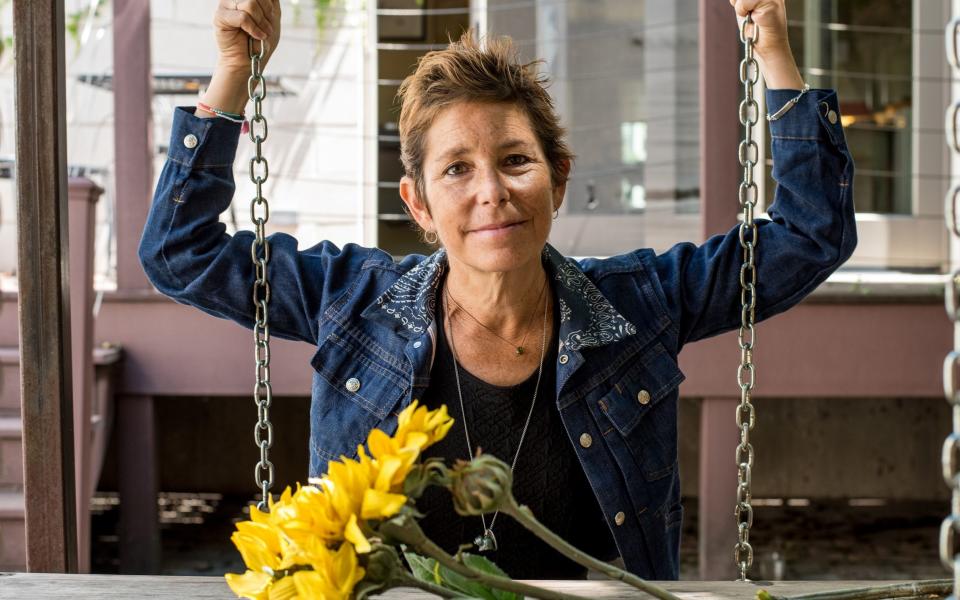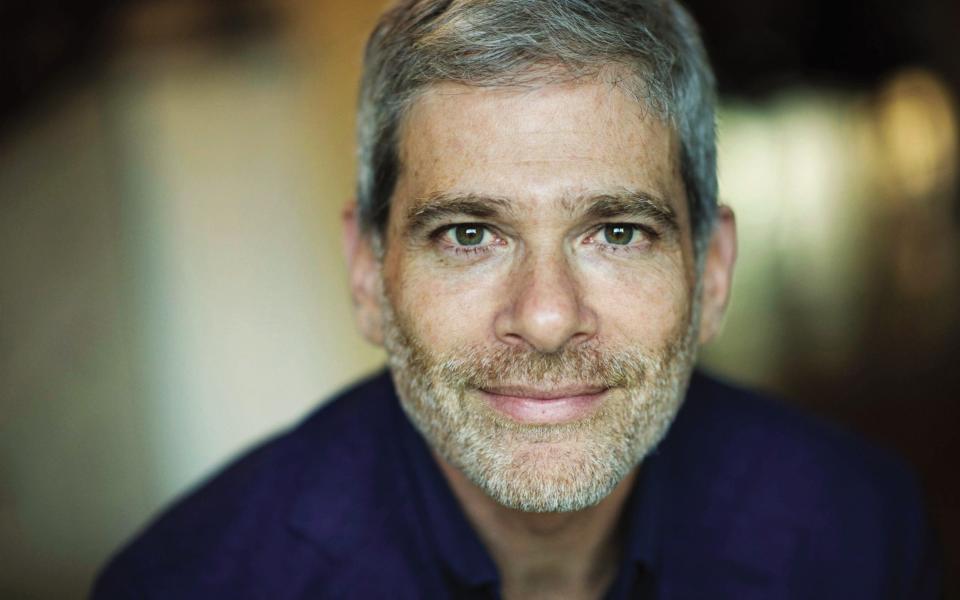The heartbreaking story of Meghan's favourite children's author


“I have been married to the most extraordinary man for 26 years,” Amy Krouse Rosenthal wrote in an open love letter to her husband, published in the New York Times’s Modern Love column in 2017.
“He is an easy man to fall in love with. I did it in one day,” the American author and filmmaker went on, before listing every one of Jason Rosenthal’s attributes, from his parenting skills – “He is an absolutely wonderful father” – to his pancake-flipping abilities and overall mastery in the kitchen. “Wait,” she adds breathlessly: “Did I mention that he is incredibly handsome? I’m going to miss looking at that face of his.”
Because ten days after the piece was published, 51-year-old Amy died of ovarian cancer. It hadn’t just been a love letter she’d secretly been writing – in between the fits of terminal agitation that still haunt her family – but a personal ad for her husband’s second wife. The letter’s title? You May Want To Marry My Husband. If that sounds familiar, it’s because over 5 million people read it.
You may have been one of them; I was. And the man I pictured through a haze of tears, three years ago, is eerily similar to the one being beamed into my study now: solid and faintly Clooney-esque with his salt ‘n’ pepper hair and all-American smile.
Only, in that time, the 55-year-old has gone from being an anonymous Chicago lawyer you “couldn’t find on Google” to an author, TED-talker, and board chair of the Amy Krouse Rosenthal Foundation, supporting ovarian cancer research and children’s literacy.

He has watched his wife’s legacy grow stronger – he was touched, he says, to see the Duchess of Sussex reading his late wife’s book, Duck! Rabbit! to little Archie in a video celebrating his first birthday earlier this week. “There he was squirming around, smiling and just being a regular little boy. What a testament to Amy that her book has such meaning to so many families,” – and he has sold Amy’s Modern Love letter to Universal Pictures. He is, today, probably the most famous widower in America; an ambassador for grief. But most of all he is “that husband.”
These are not titles many of us would yearn for, he concedes. “People in my own family will still ask me, ‘are you really sure you want to be doing this all the time?’” But “this” – the writing and public speaking on loss, grief and resilience – has become Rosenthal’s mission in life. And although he never expected his forthcoming memoir, My Wife Said You May Want To Marry Me, to be published at the peak of a global pandemic, the lessons Rosenthal learned, both during his late wife’s battle with ovarian cancer and after her death, when he and his three children – Paris, 23, Miles, 25 and Justin, 27 – were forced to find a way to heal, are more resonant than ever.
“Let’s be clear: what we’re all living through now are a series of losses,” he explains from the Chicago home in which he’s currently locked down. “Suddenly we’re in the strange position where everyone has a story of loss. Those losses may range from not being able to go outside, take your daily walk or go to the gym, to having someone close to you be really sick or die – but they are all losses. So what we’re experiencing isn’t just just like grief: it is grief.”
Before the “loss is loss is loss” epiphany Rosenthal experiences two thirds of the way through his memoir, he admits to believing in a barometer of grief. “People would come to me saying: ‘I know how you feel – I lost a dog.’ And you couldn’t help thinking: ‘How can you compare that to what I went through? I’m the one who suffered more!’.”

The ‘silver lining’ brigade were also hard to bear at first. One person who made contact with Rosenthal early on, when Amy’s essay went viral, was Sheryl Sandberg: the Facebook COO who lost her own husband to a heart attack five years ago. “I remember her saying to me: ‘Jason, you will find joy again,’ and thinking ‘yeah, right.’ But then she was one person who had been through a similar experience, and ultimately it was very helpful. Then when I did my TED talk [in 2018] and so many people descended on me afterwards with their own tales of loss, I could see how surprised and grateful they were to hear grief being spoken about openly.”
I’m curious to know whether, having experienced the extreme grief he details in his memoir – from the shock of Amy’s diagnosis and the realisation that theirs would be “a cancer family forever”, to carrying his wife’s lifeless body “through our living room to a gurney that was waiting to take her away” – Rosenthal somehow feels better equipped to deal with the mass human tragedy of Covid-19.
“Actually, I do think that those of us who have been to the depths of intense grieving have a perspective here,” he nods. “Firstly, because we realise that like everything else this will at some point be over. Over. But also because we know it’s OK to experience moments of major anxiety.
“There’s a pattern we’ll all be familiar with by now: you feel alright for a little while, and then suddenly desperately anxious or sad again. And that’s going to keep happening for a while.” Accepting that pattern will be a part of our lives for some time is helpful. “But it’s also important to share our stories. Because it’s in recognising those shared feelings that we become more resilient and start to heal.”
!["Those of us who have been to the depths of intense grieving have a perspective [on Covid-19]," says Jason](https://s.yimg.com/ny/api/res/1.2/w03KPPbWKfCnEpgo4Elx8Q--/YXBwaWQ9aGlnaGxhbmRlcjt3PTk2MA--/https://media.zenfs.com/en-GB/the_telegraph_818/c2a941e883541d81fec139afb30e4f6e)
In the short-term, Amy’s letter meant crates of letters from women all over the world, vying to be Rosenthal’s second wife. Some were “covered with stickers,” as though written by children, “many were from women who had been bereaved themselves”, and one contained the bemusing line: “I will marry you when you are ready, provided you permanently stop drinking.”
“Some just made me laugh,” he admits, and “a surprising amount contained religious books and gifts, although I would have thought it was pretty clear from what Amy wrote that we were Jewish.” Only, it was all too much, too soon. “I’d been out of the game for 30 years and had no interest in being back in the game. Back then I had no idea whether I even had the ‘fresh start’ Amy wanted in me.”
As it turns out, he did. Rosenthal has now met someone: “a hazel-eyed identical twin,” who has made him “very happy.” He won’t be drawn further on the woman Amy cast such a wide net for on her deathbed, except to say that he didn’t meet her as a result of the New York Times column, but “organically”, before the coronavirus turned our world into a place his late wife could never have imagined.

Now that he realises the value of Sandberg’s advice, does Rosenthal believe that we might emerge from this period of tragedy and adversity with a greater capacity for joy? “Absolutely. A lot of people have been asking me what Amy would have done during this situation, and from a literal standpoint, of course she would have been scared. But I also think she would have channelled that fear into creative energy and getting involved with the community. And I have already seen first-hand how this period has given people a new-found appreciation for the moments in between pain and suffering; how much kindness is being practised in a way it wasn’t before.”
“I want more time with Jason,” Amy concluded in her letter. “I want more time with my children. I want more time sipping martinis at the Green Mill Jazz Club on Thursday nights. But that is not going to happen. I probably have only a few days left being a person on this planet. So why am I doing this?”
Three years on, the answer to that question is clear to Rosenthal: Amy wrote that letter “for me and the kids, knowing it would thrust us all into this new place.” But despite finding a new partner, the “empty space” still hasn’t been filled. “So many people interpreted that line as being about me finding new love, but I always saw it as something more: as a metaphor for everything that might give the next part of my life meaning. So it doesn’t matter to me that the space is still there. After all a blank page is a pretty great place for any of us to start.”
My Wife Said You May Want To Marry Me by Jason Rosenthal is published by Harper, an imprint of HarperCollins, on May 14, £20.
Buy the e-book now for £9.99 at books.telegraph.co.uk or call 0844 871 1514


